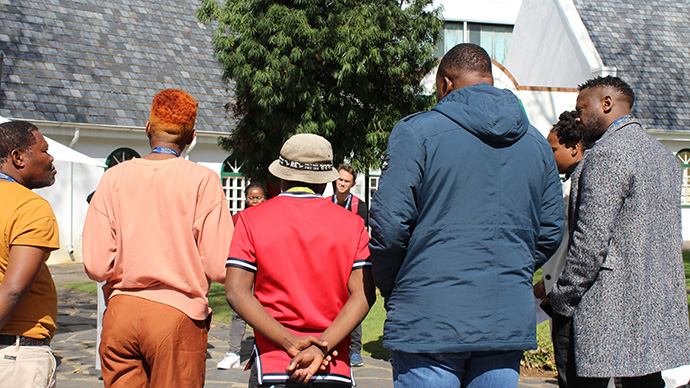As a Masters of Human Rights student, I had the privilege recently of interning at the Centre for Applied Legal Studies (CALS) located at the Faculty of Law at the University of Witwatersrand. This University, from which Nelson Mandela graduated, is renowned as a hub of the anti-apartheid movement combining law, rights and activism. My specific role as an intern was with the Gender Justice Team. As my time here ends, I am reminded of the importance of "putting yourself in someone's shoes."
On the Frontlines of Human Rights: Challenges at CALS
My journey began first on the course Human Rights in Practice, through which I got an internship, where initially I learned about South African law, court procedures, and the parliamentary system. Upon setting foot in Johannesburg in September, I was warmly welcomed and deeply engaged in practical human rights activism at CALS.
CALS also provided opportunities to attend external seminars and community engagements. For instance, it was in a study session co-hosted with other women's rights organizations, where I learned about the mental and physical violence that pregnant and childbearing women in Africa face due to obstetric violence.
However, with the extremely high standard of medical care and strict medical ethics in my home country of Japan, it takes notably longer to accurately understand the issue of obstetric violence, given the different medical circumstances and challenges present in nations facing acute health challenges.
Furthermore, I also joined the Business & Human Rights Team for environmental and human rights training for a community near a mine in the Johannesburg suburbs. While the community in question faces serious challenges from air and water pollution caused by the mining factory, the basic infrastructure is also severely lacking. Many homes do not even have access to running water, and electricity supply is inconsistent. There, I witnessed a reality far removed from the UN's Sustainable Development Goals' aim of "Leave No One Behind."
Exploring Johannesburg: Discovering Hidden Stories
During weekends, I visited essential places for human rights learners, such as the Apartheid Museum, Constitution Hill, the Mandela House, and Soweto, Johannesburg's largest township. The most impactful was Hillbrow, reputedly Johannesburg's most dangerous district.
1994, the year when Nelson Mandela became president, marked a turning point for many South Africans and emerging strong and progressive constitutional rights. But with democratization and neoliberalism came also new socio-economic challenges. Hillbrow is among the areas most affected. In its poorest regions, people are forced to live in derelict buildings without water, electricity, or gas, struggling even for basic necessities.
Many residents are foreign nationals who, unable to register as immigrants in South Africa, they find it difficult to secure employment. Their children don't have the opportunity to attend school, often spending their days in nearby parks. While many take the work they can find, others are trapped in a vicious cycle of poverty, and succumb to alcohol or drugs.
Yet, this area is home to individuals and organizations dedicated to supporting the community. When I asked organization members if they ever felt defeated by the area's overwhelming issues, they responded that seeing people they've helped strive to survive in these harsh conditions gives them strength to persevere.

"Put Yourself in Someone's Shoes"
Everyone has a unique story. The only way to truly understand it is by "putting yourself in someone's shoes." This means understanding and empathizing with others' perspectives and taking action for a better future based on those experiences.
It's not just about relying on textbooks, lectures, or media sources; hearing people's voices on the ground and experiencing their lives form the foundation of a genuine human rights defender.
My internship in Johannesburg has come to an end. What this internship has taught me is invaluable. I am convinced that the experiences equivalent to several years in just these two months will form a solid foundation for my future actions.
Miyo Tanaka, Johannesburg, South Africa.
